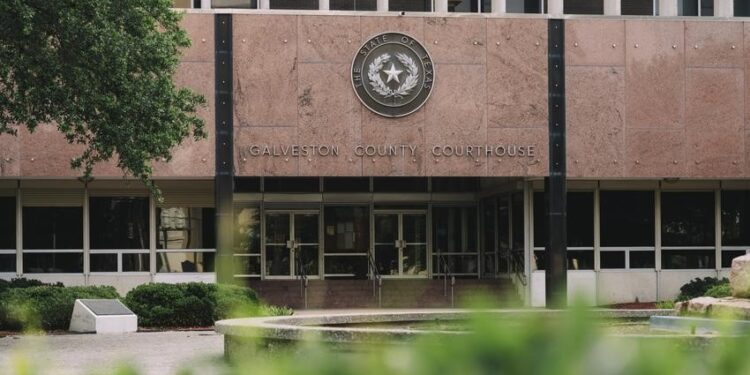Galveston County Courthouse, May 16, 2024. Photo by Joseph Bui, The Texas Tribune.
Aug 03, 2024 Story by: Editor
The 5th U.S. Circuit Court of Appeals has ruled that coalitions of minority groups cannot jointly claim that political maps constitute discriminatory gerrymandering, in a case involving Galveston County. The court’s 12-6 decision determined that the Voting Rights Act’s protections for individual racial or ethnic groups do not extend to multiple groups combining forces to argue that political boundaries dilute their votes. This ruling came after Black and Latino voters sued Galveston County for voter discrimination, following the dismantling of a district where people of color had previously formed the majority.
This decision overturns a 1988 ruling by the same court, which found that Section 2 of the Voting Rights Act did not explicitly prohibit such coalition claims. Section 2 prevents voting practices that discriminate based on race, color, or membership in a language minority group. The earlier case involved a coalition of Black and Hispanic voters challenging an at-large election system, arguing it diluted their votes.
In the new ruling, the court stated that the Voting Rights Act does not explicitly allow for coalition claims, thereby denying their legal standing. Judge Edith H. Jones, writing for the majority, stated, “Nowhere does Section 2 indicate that two minority groups may combine forces to pursue a vote dilution claim,” emphasizing that the law refers to “a class,” in the singular form.
This ruling affects only Texas, Louisiana, and Mississippi, the states under the 5th Circuit’s jurisdiction. Known for its conservative rulings, the New Orleans-based court has had several recent decisions overturned by the U.S. Supreme Court. The plaintiffs have not yet announced whether they will appeal to the Supreme Court.
The ruling has significant implications for minority groups challenging electoral maps, according to Nickolas Spencer, a lawyer representing the plaintiffs. Spencer stated, “The Fifth Circuit decision reverses its own precedent in order to make it more difficult for diverse communities to exercise their right to vote. The Court tells Black and Hispanic Americans that their shared harm cannot be [adjudicated] together. In practice, this means it often can’t be [adjudicated] at all.”
Six judges dissented from the majority opinion, with Judge Dana M. Douglas arguing that the decision could lead to grave consequences by suggesting that discrimination is acceptable if the victims are racially diverse.
The case was originally brought by Galveston County residents, with support from the U.S. Department of Justice, three branches of the NAACP, and a branch of the League of United Latin American Citizens. Although this decision impacts the plaintiffs’ Section 2 claims, the lawsuit includes two other avenues for litigation that will be addressed in district court.
The lawsuit was sparked by redistricting efforts in Galveston County, where commissioners split up Precinct 3. This precinct had previously allowed Black and Latino residents to form coalitions and elect their preferred representatives. After the 2020 census, the precinct, which included diverse areas with a significant Black population, was redrawn into a smaller, predominantly white district. This change ensured that white voters now make up at least 62% of the electorate in each of the four precincts, effectively diluting the electoral power of Black and Latino communities.
In October, a federal judge ruled that Galveston County’s redistricting maps violated Section 2 of the Voting Rights Act by diluting the voting power of Black and Latino residents. A month later, a three-judge panel from the 5th Circuit agreed but questioned the precedent allowing minority coalitions to sue, leading to the full court’s review and the subsequent ruling.
The court’s new ruling argued that allowing coalitions of different racial or ethnic groups to make vote-dilution claims would complicate redistricting and inundate courts with complex cases. However, Sarah Xiyi Chen, an attorney with the Texas Civil Rights Project involved in the case, noted that such coalition claims are rare and difficult to prove, contradicting the majority’s argument about the challenges these cases pose.
Voting rights advocates have criticized the appeals court’s decision to overturn its own precedent. Hilary Harris Klein, an attorney for the Southern Coalition for Social Justice representing the plaintiffs, said, “The Fifth Circuit reversed decades of settled law to deny relief to Black and Latino voters seeking nothing more than equal voting power and a voice in their local government. Plaintiffs proved their case at trial, and in response, the appellate court moved the goalpost.” Source: News From The States

















